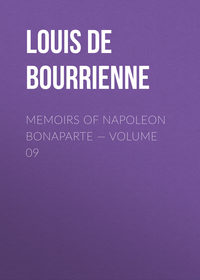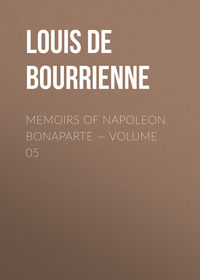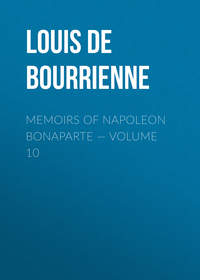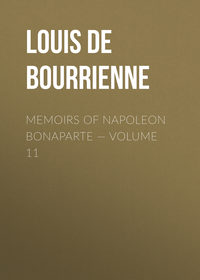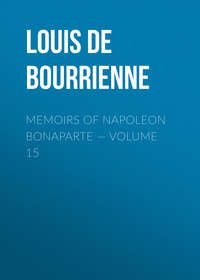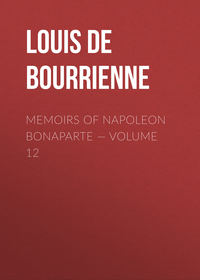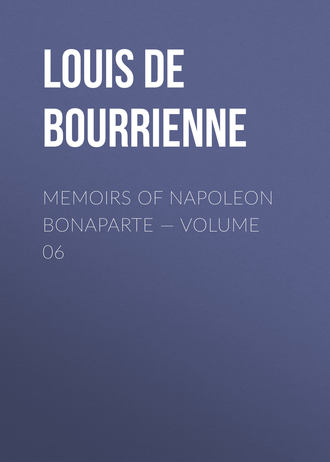 полная версия
полная версияMemoirs of Napoleon Bonaparte — Volume 06
Not only did the First Consul not like Fouche, but it is perfectly true that at this time the police wearied and annoyed him. Several times he told me he looked on it as dangerous, especially for the possessor of power. In a Government without the liberty of the press he was quite right. The very services which the police had rendered to the First Consul were of a nature to alarm him, for whoever had conspired against the Directory in favour of the Consulate might also conspire against the Consulate in favour of any other Government. It is needless to say that I only allude to the political police, and not to the municipal police, which is indispensable for large towns, and which has the honourable mission of watching over the health and safety of the citizens.
Fouche, as has been stated, had been Minister of Police since the 18th Brumaire. Everybody who was acquainted with, the First Consul's character was unable to explain the ascendency which he had suffered Fouche to acquire over him, and of which Bonaparte himself was really impatient. He saw in Fouche a centre around which all the interests of the Revolution concentrated themselves, and at this he felt indignant; but, subject to a species of magnetism, he could not break the charm which enthralled him. When he spoke of Fouche in his absence his language was warm, bitter, and hostile. When Fouche was present, Bonaparte's tone was softened, unless some public scene was to be acted like that which occurred after the attempt of the 3d Nivose.
The suppression of the Ministry of Police being determined on, Bonaparte did not choose to delay the execution of his design, as he had pretended to think necessary. On the evening of the 12th of September we went to Mortfontaine. We passed the next day, which was Monday, at that place, and it was there, far removed from Fouche, and urged by the combined persuasions of Joseph and Lucien, that the First Consul signed the decree of suppression. The next morning we returned to Paris. Fouche came to Malmaison, where we were, in the regular execution of his duties. The First Consul transacted business with him as usual without daring to tell him of his dismissal, and afterwards sent Cambaceres to inform him of it. After this act, respecting which he had hesitated so long, Bonaparte still endeavoured to modify his rigour. Having appointed Fouche a Senator, he said in the letter which he wrote to the Senate to notify the appointment:
"Fouche, as Minister of Police, in times of difficulty, has by his talent, his activity, and his attachment to the Government done all that circumstances required of him. Placed in the bosom of the Senate, if events should again call for a Minister of Police the Government cannot find one more worthy of its confidence."
From this moment the departments of Justice and Police united were confided to the hands of Regnier.' Bonaparte's aversion for Fouche strangely blinded him with respect to the capabilities of his successor. Besides, how could the administration of justice, which rests on fixed, rigid, and unchangeable bases, proceed hand in hand with another administration placed on the quicksand of instantaneous decisions, and surrounded by stratagems and deceptions? Justice should never have anything to do with secret police, unless it be to condemn it.
—[M. Abrial, Minister of Justice, was called to the Senate at the same time as Fouche. Understanding that the assimilation of the two men was more a disgrace to Abrial than the mere loss of the Ministry, the First Consul said to M. Abrial: "In uniting the Ministry of Police to that of Justice I could not retain yon in the Ministry, you are too upright a man to manage the police." Not a flattering speech for Regnier.—Bourrienne.]—
What could be expected from Regnier, charged as he was with incompatible functions? What, under such circumstances, could have been expected even from a man gifted with great talents? Such was the exact history of Fouche's disgrace. No person was more afflicted at it than Madame Bonaparte, who only leaned the news when it was announced to the public. Josephine, on all occasions, defended Fouche against her husband's sallies. She believed that he was the only one of his Ministers who told him the truth. She had such a high opinion of the way in which Fouche managed the police that the first time I was alone with her after our return from Mortfontaine she said to me, "My dear Bourrienne; speak openly to me; will Napoleon know all about the plots from the police of Moncey, Duroc, Junot, and of Davoust? You know better than I do that these are only wretched spies. Has not Savary also eventually got his police? How all this alarms me. They take away all my supports, and surround me only with enemies."—"To justify your regrets we should be sure that Fouche has never been in agreement with Lucien in favour of the divorce."—"Oh, I do not believe that. Bonaparte does not like him, and he would have been certain to tell me of it when I spoke favourably to him of Fouche. You will see that his brothers will end by bringing him into their plan."
I have already spoken of Josephine's troubles, and of the bad conduct of Joseph, but more particularly of Lucien, towards her; I will therefore describe here, as connected with the disgrace of Fouche, whom Madame Bonaparte regretted as a support, some scenes which occurred about this period at Malmaison. Having been the confidant of both parties, and an involuntary actor in those scenes, now that twenty-seven years have passed since they occurred what motive can induce me to disguise the truth in any respect?
Madame Louis Bonaparte was enceinte. Josephine, although she tenderly loved her children, did not seem to behold the approaching event which the situation of her daughter indicated with the interest natural to the heart of a mother. She had long been aware of the calumnious reports circulated respecting the supposed connection between Hortense and the First Consul, and that base accusation cost her many tears. Poor Josephine paid dearly for the splendour of her station! As I knew how devoid of foundation these atrocious reports were, I endeavoured to console her by telling her what was true, that I was exerting all my efforts to demonstrate their infamy and falsehood. Bonaparte, however, dazzled by the affection which was manifested towards him from all quarters, aggravated the sorrow of his wife by a silly vanity. He endeavoured to persuade her that these reports had their origin only in the wish of the public that he should have a child, so that these seeming consolations offered by self-love to Josephine's grief gave force to existing conjugal alarms, and the fear of divorce returned with all its horrors. Under the foolish illusion of his vanity Bonaparte imagined that France was desirous of being governed even by a bastard if supposed to be a child of his,—a singular mode truly of founding a new legitimacy!
Josephine, whose susceptibility appears to me even now excusable, well knew my sentiments on the subject of Bonaparte's founding a dynasty, and she had not forgotten my conduct when two years before the question had been agitated on the occasion of Louis XVIII.'s letters to the First Consul. I remember that one day, after the publication of the parallel of Caesar, Cromwell, and Bonaparte, Josephine having entered our cabinet without being announced, which she sometimes did when from the good humour exhibited at breakfast she reckoned upon its continuance, approached Bonaparte softly, seated herself on his knee, passed her hand gently through his hair and over his face, and thinking the moment favourable, said to him in a burst of tenderness, "I entreat of you, Bonaparte, do not make yourself a King! It is that wretch Lucien who urges you to it. Do not listen to him!" Bonaparte replied, without anger, and even smiling as he pronounced the last words, "You are mad, my poor Josephine. It is your old dowagers of the Faubourg St. Germain, your Rochefoucaulds, who tell you all these fables!…… Come now, you interrupt me—leave me alone."
What Bonaparte said that day good-naturedly to his wife I have often heard him declare seriously. I have been present at five or six altercations on the subject. That there existed, too, an enmity connected with this question between the family of BEAUHARNAIS and the family of Bonaparte cannot be denied.
Fouche, as I have stated, was in the interest of Josephine, and Lucien was the most bitter of her enemies. One day Raederer inveighed with so much violence against Fouche in the presence of Madame Bonaparte that she replied with extreme warmth, "The real enemies of Bonaparte are those who feed him with notions of hereditary descent, of a dynasty, of divorce, and of marriage!" Josephine could not check this exclamation, as she knew that Roederer encouraged those ideas, which he spread abroad by Lucien's direction. I recollect one day when she had been to see us at our little house at Ruel: as I walked with her along the high road to her carriage, which she had sent forward, I acknowledged too unreservedly my fears on account of the ambition of Bonaparte, and of the perfidious advice of his brothers. "Madame," said I, "if we cannot succeed in dissuading the General from making himself a King, I dread the future for his sake. If ever he re-establishes royalty he will in all probability labour for the Bourbons, and enable them one day to re-ascend the throne which he shall erect. No one, doubtless, without passing for a fool, can pretend to say with certainty what series of chances and events such a proceeding will produce; but common sense alone is sufficient to convince any one that unfavourable chances must long be dreaded. The ancient system being re-established, the occupation of the throne will then be only a family question, and not a question of government between liberty and despotic power. Why should not France, if it ceases to be free, prefer the race of her ancient kings? You surely know it. You had not been married two years when, on returning from Italy, your husband told me that he aspired to royalty. Now he is Consul for life. Would he but resolve to stop there! He already possesses everything but an empty title. No sovereign in Europe has so much power as he has. I am sorry for it, Madame, but I really believe that, in spite of yourself, you will be made Queen or Empress."
Madame Bonaparte had allowed me to speak without interruption, but when I pronounced the words Queen and Empress she exclaimed, "My God! Bourrienne, such ambition is far from my thoughts. That I may always continue the wife of the First Consul is all I desire. Say to him all that you have said to me. Try and prevent him from making himself King."—"Madame," I replied, "times are greatly altered. The wisest men, the strongest minds, have resolutely and courageously opposed his tendency to the hereditary system. But advice is now useless. He would not listen to me. In all discussions on the subject he adheres inflexibly to the view he has taken. If he be seriously opposed his anger knows no bounds; his language is harsh and abrupt, his tone imperious, and his authority bears down all before him."—"Yet, Bourrienne, he has so much confidence in you that of you should try once more!"—"Madame, I assure you he will not listen to me. Besides, what could I add to the remarks I made upon his receiving the letters of Louis XVIII., when I fearlessly represented to him that being without children he would have no one to whom to bequeath the throne—that, doubtless, from the opinion which be entertained of his brothers, he could not desire to erect it for them?" Here Josephine again interrupted me by exclaiming, "My kind friend, when you spoke of children did he say anything to you? Did he talk of a divorce?"—"Not a word, Madame, I assure you."—"If they do not urge him to it, I do not believe he will resolve to do such a thing. You know how he likes Eugene, and Eugene behaves so well to him. How different is Lucien. It is that wretch Lucien, to whom Bonaparte listens too much, and of whom, however, he always speaks ill to me."—"I do not know, Madame, what Lucien says to his brother except when he chooses to tell me, because Lucien always avoids having a witness of his interviews with your husband, but I can assure you that for two years I have not heard the word 'divorce' from the General's mouth."—"I always reckon on you, my dear Bourrienne; to turn him away from it; as you did at that time."—"I do not believe he is thinking of it, but if it recurs to him, consider, Madame, that it will be now from very different motives: He is now entirely given up to the interests of his policy and his ambition, which dominate every other feeling in him. There will not now be any question of scandal, or of a trial before a court, but of an act of authority which complaisant laws will justify and which the Church perhaps will sanction."—"That's true. You are right. Good God! how unhappy I am."
—[When Bourrienne complains of not knowing what passed between Lucien and Napoleon, we can turn to Lucien's account of Bourrienne, apparently about this very time. "After a stormy interview with Napoleon," says Lucien, "I at once went into the cabinet where Bourrienne was working, and found that unbearable busybody of a secretary, whose star had already paled more than once, which made him more prying than ever, quite upset by the time the First Consul had taken to come out of his bath. He must, or at least might, have heard some noise, for enough had been made. Seeing that he wanted to know the cause from me, I took up a newspaper to avoid being bored by his conversation" (Iung's Lucien, tome ii. p.156)]—
Such was the nature of one of the conversations I had with Madame Bonaparte on a subject to which she often recurred. It may not perhaps be uninteresting to endeavour to compare with this what Napoleon said at St. Helena, speaking of his first wife. According to the Memorial Napoleon there stated that when Josephine was at last constrained to renounce all hope of having a child, she often let fall allusions to a great political fraud, and at length openly proposed it to him. I make no doubt Bonaparte made use of words to this effect, but I do not believe the assertion. I recollect one day that Bonaparte, on entering our cabinet, where I was already seated, exclaimed in a transport of joy impossible for me to describe, "Well, Bourrienne, my wife is at last enceinte!" I sincerely congratulated him, more, I own, out of courtesy than from any hope of seeing him made a father by Josephine, for I well remembered that Corvisart, who had given medicines to Madame Bonaparte, had nevertheless assured me that he expected no result from them. Medicine was really the only political fraud to which Josephine had recourse; and in her situation what other woman would not have done as much? Here, then, the husband and the wife are in contradiction, which is nothing uncommon. But on which side is truth? I have no hesitation in referring it to Josephine. There is indeed an immense difference between the statements of a women—trusting her fears and her hopes to the sole confidant of her family secrets, and the tardy declaration of a man who, after seeing the vast edifice of his ambition leveled with the dust, is only anxious, in his compulsory retreat, to preserve intact and spotless the other great edifice of his glory. Bonaparte should have recollected that Caesar did not like the idea of his wife being even suspected.
CHAPTER XII
1802.
Citizen Fesch created Cardinal Fesch—Arts and industry—Exhibition in the Louvre—Aspect of Paris in 1802—The Medicean Venus and the Velletrian Pallas—Signs of general prosperity—Rise of the funds— Irresponsible Ministers—The Bourbons—The military Government— Annoying familiarity of Lannes—Plan laid for his disgrace— Indignation of Lannes—His embassy to Portugal—The delayed despatch—Bonaparte's rage—I resign my situation—Duroc— I breakfast with Bonaparte—Duroc's intercession—Temporary reconciliation.
Citizen Fesch, who, when we were forced to stop at Ajaccio on our return from Egypt, discounted at rather a high rate the General-in-Chief's Egyptian sequins, became again the Abbe Fesch, as soon as Bonaparte by his Consular authority re-erected the altars which the Revolution had overthrown. On the 15th of August 1802 he was consecrated Bishop, and the following year received the Cardinal's hat. Thus Bonaparte took advantage of one of the members of his family being in orders to elevate him to the highest dignities of the Church. He afterwards gave Cardinal Fesch the Archbishopric of Lyons, of which place he was long the titular.
—[Like Cambaceres the Cardinal was a bit of a gourmet, and on one occasion had invited a large party of clerical magnates to dinner. By a coincidence two turbots of singular beauty arrived as presents to his Eminence on the very morning of the feast. To serve both would have appeared ridiculous, but the Cardinal was most anxious to have the credit of both. He imparted his embarrassment to his chef:
"'Be of good faith, your Eminence,' was the reply, 'both shall appear and enjoy the reception so justly their due.' The dinner was served: one of the turbots relieved the soup. Delight was on every face—it was the moment of the 'eprouvette positive'. The 'maitre a'hotel' advances; two attendants raise the turbot and carry him off to cut him up; but one of them loses his equilibrium: the attendants and the turbot roll together on the floor. At this sad sight the assembled Cardinals became as pale as death, and a solemn silence reigned in the 'conclave'—it was the moment of the 'eprouvette negative'; but the 'maitre a'hotel' suddenly turns to one of the attendants, Bring another turbot,' said he, with the most perfect coolness. The second appeared, and the eprouvette positive was gloriously renewed." (Hayward's Art of Dining, P. 65.)]—
The First Consul prided himself a good deal on his triumph, at least in appearance, over the scruples which the persons who surrounded him had manifested against the re-establishment of worship. He read with much self-satisfaction the reports made to him, in which it was stated that the churches were well frequented: Indeed, throughout the year 1802, all his attention wad directed to the reformation of manners, which had become more dissolute under the Directory than even during the Reign of Terror.
In his march of usurpation the First Consul let slip no opportunity of endeavouring to obtain at the same time the admiration of the multitude and the approbation of judicious men. He was very fond of the arts, and was sensible that the promotion of industry ought to be the peculiar care of the head of the Government. It must, however, at the same time be owned that he rendered the influence of his protection null and void by the continual violations he committed on that liberty which is the animating principle of all improvement.
During the supplementary days of the year X., that is to say, about the beginning of the autumn of 1802, there was held at the Louvre an exhibition of the products of industry. The First Consul visited the exhibition, and as even at that period he had begun to attribute every good result to himself, he seemed proud of the high degree of perfection the manufacturing arts had attained in France. He was, above all, delighted with the admiration this exhibition excited among the numerous foreigners who resorted to Paris during the peace.
In fact, throughout the year 1802 the capital presented an interesting and animating-spectacle. The appetite for luxury and pleasure had insinuated itself into manners—which were no longer republican, and the vast number of Russians and English who drove about everywhere with brilliant equipages contributed not a little to this metamorphosis. All Paris flocked to the Carrousel on review days, and regarded with eyes of delight the unusual sight of rich foreign liveries and emblazoned carriages. The parties at the Tuileries were brilliant and numerous, and nothing was wanting but the name of levees. Count Markoff, who succeeded M. de Kalitscheff as Russian ambassador; the Marquis de Lucchesini, the Prussian ambassador; and Lord Whitworth, the Minister from England, made numerous presentations of their countrymen to the First Consul, who was well pleased that the Court he was forming should have examples set by foreign courtiers. Never since the meeting of the States-General had the theatres been so frequented, or fetes so magnificent; and never since that period had Paris presented so cheering an aspect. The First Consul, on his part, spared no exertion to render the capital more and more worthy the admiration of foreigners. The statue of the Venus de Medicis, which had been robbed from the gallery of the Grand Duke of Tuscany, now decorated the gallery of the Louvre, and near it was placed that of the Velletrian Pallas, a more legitimate acquisition, since it was the result of the researches of some French engineers at Velletri. Everywhere an air of prosperity was perceptible, and Bonaparte proudly put in his claim to be regarded as the author of it all. With what heartfelt satisfaction did he likewise cast his eye upon what he called the grand thermometer of opinion, the price of the funds! For if he saw them doubled in value in consequence of the revolution of the 18th Brumaire, rising as they did at that period from seven to sixteen francs, this value was even more than tripled after the vote of Consulship for life and the 'Senates-consulte' of the 4th of August,—when they rose to fifty-two francs.
While Paris presented so satisfactory an aspect the departments were in a state of perfect tranquillity; and foreign affairs had every appearance of security. The Court of the Vatican, which since the Concordat may be said to have become devoted to the First Consul, gave, under all circumstances, examples of submission to the wishes of France. The Vatican was the first Court which recognised the erection of Tuscany into the Kingdom of Etruria, and the formation of the Helvetic, Cisalpine, and Batavian Republics. Prussia soon followed the example of the Pope, which was successively imitated by the other powers of Europe.
The whole of these new states, realms, or republics were under the immediate influence of France. The Isle of Elba, which Napoleon's first abdication afterwards rendered so famous, and Piedmont, divided into six departments, were also united to France, still called it Republic. Everything now seemed to concur in securing his accession to absolute power. We were now at peace with all the world, and every circumstance tended to place in the hands of the First Consul that absolute power which indeed was the only kind of government be was capable of forming any conception of. Indeed, one of the characteristic signs of Napoleon's government, even under the Consular system, left no doubt as to his real intentions. Had he wished to found a free Government it is evident that he world have made the Ministers responsible to the country, whereas he took care that there should be no responsibility but to himself. He viewed them, in fact, in the light of instruments which he might break as be pleased. I found this single index sufficient to disclose all his future designs In order to make the irresponsibility of his Ministers to the public perfectly clear, he had all the acts of his Government signed merely by M. Maret, Secretary of State. Thus the Consulship for life was nothing but an Empire in disguise, the usufruct of which could not long satisfy the First Consul's ambition. His brothers influenced him, and it was resolved to found a new dynasty.
It was not in the interior of France that difficulties were likely first to arise on Bonaparte's carrying his designs into effect, but there was some reason to apprehend that foreign powers, after recognising and treating with the Consular Government, might display a different feeling, and entertain scruples with regard to a Government which had resumed its monarchical form. The question regarding the Bourbons was in some measure kept in the background as long as France remained a Republic, but the re-establishment of the throne naturally called to recollection the family which had occupied it for so many ages. Bonaparte fully felt the delicacy of his position, but he knew how to face obstacles, and had been accustomed to overcome them: he, however, always proceeded cautiously, as when obstacles induced him to defer the period of the Consulship for life.


